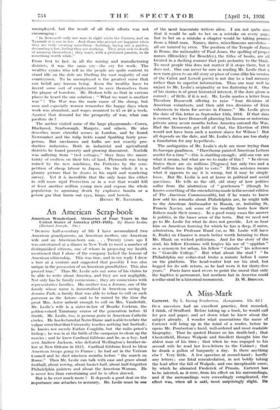An American Scrap-book
"DURING half-a-century of life I have accumulated two American grandparents, an American mother, one American wife and an American-born son. . . . Twenty years ago I was entertained at a dinner in New York to meet a number of distinguished citizens, one of whom in proposing my health mentioned that I alone of the company lacked the honour of American citizenship. This was true, and in my reply I drew a bow at a venture and suggested that possibly I was also unique in the possession of an American grandfather. This also proved true." Thus Mr. Leslie sets out some of his claims to be able to write about America, and they are not negligible. Not only has he family connexions ; they are connexions with representative families. His mother was a Jerome, one of the family whose name is immortalised in American racing by Jerome Park, a family that was able to refuse to call on such parvenus as the Astors—and to be ruined by the time the great Mrs. Astor unbent enough to call on Mrs. Vanderbilt. Mr. Leslie's wife is a sister-in-law of Bourke Cockran, the golden-voiced Tammany orator of the generation before Al Smith. Mr. Leslie, too, is persona grata in American Catholic! circles. He has lectured at Notre Dame and is able to refute the vulgar error that that University teaches nothing but football ; he knows not merely Father Coughlin, but the radio priest's bishop ; he was in at the birth of the campaign to clean up the movies ; and he knew Cardinal Gibbons and he, as a boy, had seen Andrew Jackson, who defeated Wellington's brother-in- law at New Orleans in 1815. Cardinal Gibbons lived to bless American troops going to France ; he had sat in the Vatican Council and he died nineteen months before "the march on Rome." Then Mr. Leslie can talk with ease and grace about football, about rowing, about basket-ball, about half-forgotten Philadelphia painters and about the American Woman. He is never less than entertaining and he is often shrewd.
But is he ever much more ? It depends a good deal on the importance one attaches to accurary. Mr. Leslie must he one . - of the most inaccurate writers alive. I am not quite sure that it would be safe to bet on a mistake on every page, but to bet on a mistake 'a chapter would be taking pennies from a blind man. Names, dates, miscellaneous anecdotes— all are tainted by error. The position of the Temple of Janus in Rome, the nationality of Paul Jones, the spelling of proper names (Blenekley for Benchley), the titles of books, are all treated in a dashing manner that puts pedantry to the blush. To most people this does not matter if it stops there, but it does not. One can never be sure in reading Mr. Leslie that a new turn given to an old story or piece of verse (like his version of the Cabot and Lowell poem) is not due to a bad memory rather than to superior information. Thus one may well be Unjust to Mr. Leslie's originality or too flattering to it. One of his stories is of great historical interest, if the date given is correct ; of little, if it is not. Mr. Leslie quotes a letter from Theodore Roosevelt offering to raise "four divisions of American volunteers, and then add two divisions of Irish volunteers to them for service in France." Mr. Leslie gives the date of this letter as September 15th, 1916. If that date is correct, we have Roosevelt planning his famous or notorious private army seven months before America entered the War. Had the Democrats got hold of that, the Election of 1916 would not have been such a narrow shave for Wilson ! But all depends on the date, and Mr. Leslie's dates are US° shaky a foundation for any hypothesis.
The ambiguities of Mr. Leslie's style are more trying than its baroque gaudiness. "Hawthorne painted American Letters scarlet for a time"—this is startling enough; still one can see what it means, but what are we to make of this ? "In eleven States there are six millions [Negroes] but only two and a half million have the right to vote." If this sentence means what it appears to say it is wrong, but it may be simply loose. But Mr. Leslie is not at home in political and social questions. He tells us the old, old story of how politics suffer from the abstention of 'gentlemen" (though he knows something of the emendations made in the second edition of The American Commonwealth), but if he wants to know how odd his remarks about Philadelphia are, he might talk to the American Ambassador to Russia, or, imitating St. Francis Xavier, ask some of his wealthy hosts how their fathers made their money. In a good many cases the answer is politics, in the baser sense of the term. But we need not go to Mr. Leslie for what he does not provide. Let us hear him on American learning for which he has a deep, if naive, admiration, for Professor Ruud (or, as Mr. Leslie will have it, Rude) on Chaucer is much better worth listening to than Mr. Blank on wicked politicians. And for the story of the stud, his fellow Etonians will forgive his use of " oppidan " as a synonym for urban, his fellow " Cantabs " his reference to " Gonville College." But what about the stud ? "In Philadelphia my collar-stud broke a minute before I came on the platform. The head-waiter lent me his stud, but begged for its safe return, as he had worn it for thirty-five years." Poets have used rivers to point the moral that only the fugitive is permanent, but nowhere but in America could
a collar-stud be a historical monument. D. W. BROGAN.


















































 Previous page
Previous page